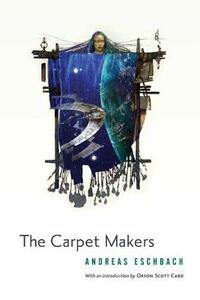Take a photo of a barcode or cover
adventurous
challenging
mysterious
reflective
medium-paced
Plot or Character Driven:
Plot
Flaws of characters a main focus:
No
This is a soft SF written as a series of linked stories by [a:Andreas Eschbach|40381|Andreas Eschbach|https://images.gr-assets.com/authors/1200336594p2/40381.jpg], a SF author from Germany. I read it as a part of monthly reading for August 2021 at Speculative Fiction in Translation group.
The story starts in a strange world, which a reader initially cannot place: there is a carpet maker, his several wives and a son. The maker is already old and trembling, but he has to finish his work – a carpet from hair of his wives that will go to the Emperor’s palace, just like his father did before him and his son should do after him. However, his son, influenced from outside the house is unsure is there still the Emperor, and should he spend his whole life just like his father has done?
The stories like hairs in the carpet are linked with one another as readers see ever larger tapestry – the carpet makers and their traditions, carpet traders, tax collectors, ordinary folk whose labor support that trade and unordinary people who try to understand the whole mystery, for with all these carpets over generations there should be no place for them in the Emperor’s palace.
This is definitely an unusual story, alluding greatly to spiritual texts, which try to describe how a person can be so devoted that they leave problems of material world behind trying to reach a higher goal. There are almost no dialogues, the story is given as a wall of text, which can be a sign of German literature in general, for similar structure can be seen e.g. in [a:Hermann Hesse|1113469|Hermann Hesse|https://images.gr-assets.com/authors/1499981916p2/1113469.jpg] works. Long paragraphs in no way mean boring, the story grabs and holds the reader.
The story starts in a strange world, which a reader initially cannot place: there is a carpet maker, his several wives and a son. The maker is already old and trembling, but he has to finish his work – a carpet from hair of his wives that will go to the Emperor’s palace, just like his father did before him and his son should do after him. However, his son, influenced from outside the house is unsure is there still the Emperor, and should he spend his whole life just like his father has done?
The stories like hairs in the carpet are linked with one another as readers see ever larger tapestry – the carpet makers and their traditions, carpet traders, tax collectors, ordinary folk whose labor support that trade and unordinary people who try to understand the whole mystery, for with all these carpets over generations there should be no place for them in the Emperor’s palace.
This is definitely an unusual story, alluding greatly to spiritual texts, which try to describe how a person can be so devoted that they leave problems of material world behind trying to reach a higher goal. There are almost no dialogues, the story is given as a wall of text, which can be a sign of German literature in general, for similar structure can be seen e.g. in [a:Hermann Hesse|1113469|Hermann Hesse|https://images.gr-assets.com/authors/1499981916p2/1113469.jpg] works. Long paragraphs in no way mean boring, the story grabs and holds the reader.
adventurous
mysterious
medium-paced
Plot or Character Driven:
Plot
Strong character development:
Complicated
Loveable characters:
Complicated
Diverse cast of characters:
No
Flaws of characters a main focus:
Yes
I loved how this book read like a collection of character studies. It established the world in a very interesting way, and allows the reader to have a full perspective in a way that wasn't clunky or boring. The story felt like it transcended time by switching between perspectives in primitive and advanced societies. Not everyone's cup of tea, but I felt that the format kept my attention.
However, I'm actually pretty disappointed with the ending. The buildup of the core mystery was wonderful, but the presentation of the answer was... not my favorite. Also, I think the female characters in this book could have used more depth. It's a little frustrating that even in other-worldly universes, Sci-fi characters are still diminished to our strange gender stereotypes/tropes. Having a difficult time picking a rating based on that alone.
However, I'm actually pretty disappointed with the ending. The buildup of the core mystery was wonderful, but the presentation of the answer was... not my favorite. Also, I think the female characters in this book could have used more depth.
Spoiler
The whole setup of the historian and archivist was unbelievable and a little frustrating. And having the historian talk with her sister about an old man that makes her "moist between her legs" actually made me more uncomfortable than most other things in the book. (who talks with their siblings like that?) The flirting between the two made me cringe. It revealed a poor understanding of women on Eschbach's part. The fact that this was the vehicle for the ending was immensely disappointing.
Even though the stories seemed to be disconnected at times, I was intrigued by the different storylines. As I expected/hoped most of them came together in the end. Although I can't help but think we're not that different from the Carpet Makers ourselves.
Spoiler
The ending was heartbreaking. The feeling of how crushingly futile their whole way of life turned out to be felt like a weight.
adventurous
medium-paced
Plot or Character Driven:
A mix
Strong character development:
No
Loveable characters:
Complicated
Diverse cast of characters:
Yes
Flaws of characters a main focus:
No
dark
mysterious
reflective
medium-paced
Plot or Character Driven:
Plot
Strong character development:
No
Loveable characters:
Complicated
Diverse cast of characters:
No
Flaws of characters a main focus:
Complicated
I don't give five stars lightly. This is one of the best works of speculative fiction I've ever read. I went into it blind, with no expectations, and I recommend that experience.
challenging
mysterious
reflective
slow-paced
Strong character development:
No
Loveable characters:
Complicated
Diverse cast of characters:
Yes
Flaws of characters a main focus:
Complicated
Right, so good things first:
- That structure. The spiralling out of context, the slow reveal of a world so much bigger than any of its pieces realised. I had to check, a couple of chapters in, whether the book was actually scifi. I was sure it was, and yet what I was reading was more like, anthropological fantasy? or something? Starting the book there, and staying in that mode, but revealing more of the world bit by bit, life by life, meant the story felt expansive, journeying, was constantly revealing more, whilst never really having to do pioneer stuff. Every character knew their role, knew their place in the universe — even as that universe grew for both them and me.
- The story. The novel is a series of vignettes, but there is a story which they are all in service of.
The Emperor and the King and their weird feud is ultimately what it’s all about. I’ve put that as a spoiler, because the ultimate point is so far from where the book starts, and I don’t want to interfere with the process of working your way there, which I think makes the book unique. Having said that, the rest of this is kind of a spoiler for vibes so maybe pause if you haven’t read yet. The ending’s both pretty silly and deeply nihilistic, yes, and it completely wouldn’t work if you didn’t spend so much time with the carpet makers at the beginning, so you understand the stakes and the cruelty of this (star, production, cultural) systemdedicated entirely to the gratification of the rulers . There’s a horror that doesn’t just overcome the pulpiness of the conclusion, but relies on it. - The subject. This is a book about colonialism, and I think it‘s broadly successful in its critique. There’s a moment in the last chapter where it’s acknowledged that this (honestly incomprehensibly) vast story about the carpet makers is just one of many, one cabinet in one corner of a 400 floor archive. And I think that’s key. I’m not sure how to articulate that further, lol sorry, but knowing this is just one example, and yet so overwhelming for so many people— it works for me, even if isn’t the most gracefully articulated.
Which brings me onto the bad, I suppose. Which is that the vignettes that make up the story frequently don’t work. I found myself getting a bit worn down by the early ones, and really quite unimpressed by the attempts to depict romance. Eschbach doesn’t know how to write women, and generally relies on very broad strokes to characterise people in the short amount of time he gives himself to spend with them. Which is fine: there’s a sense of the parable to them, and he’s good enough at painting relationships between men that there’s a depth too. But it means that his points can be inelegant or unsubtle.
Since finishing this, I’ve been debating with myself about whether this book is more than the sum of its parts, or the whole is pulled down by them. Ultimately, I think the structure is worth pushing through the bits which drag for, but perhaps only if you’re a fast reader. Having said that, I probably wouldn’t be quite so critical if the book didn’t end on the note it does — I found the final chapter particularly infuriating. Literally even thinking about it makes me mad lol.
It’s also worth acknowledging that this is a book about colonialism that uses its scifi setting to sidestep discussing things like race and complicity (everyone is under the thumb of the emperor, who alone dominates, ignoring the way that whole classes and countries benefit from and uphold colonialism irl). This is ultimately very much a parable. It’s an interesting contrast to something like A Memory Called Empire, another sci fi novel entirely concerned with imperialism, which I think deals with those things much better, and feels more realist in tone as a result. And yet I found the storytelling in AMCE lacking, and its world rather stage set, and actually less convincing than that in The Carpet Makers — I think as a result of its focus on one person, who didn’t feel grounded, imbedded. Between these two novels, there’s something really good. For the moment, there’s definitely interesting.





